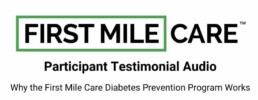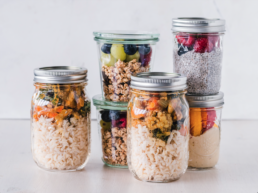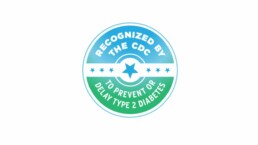By Juliana Ronn, First Mile Care Director of Operations
Rickey Breeding is a 69-year-old auto mechanic and U.S. navy veteran. He is now retired from Ford Motor Company and lives in Redford Township, a suburb of Detroit. He joined the year-long First Mile Care Diabetes Prevention Program (DPP) in August 2022.
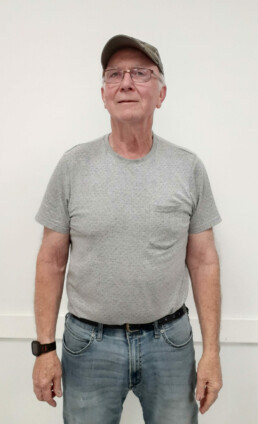
Rickey, you’re nearly finished with the First Mile Care DPP. What results have you seen so far?
- I’ve lost more than 50 pounds — specifically 55! In the past, I weighed as much as 265. My goal when joining the First Mile Care program was to get under 200 pounds and stay there. I’ve accomplished that.
- My A1C is now solidly in the normal range according to my doctor, at 5.4. Before starting the DPP, I was at 5.7, which is borderline prediabetes.
- My clothes didn’t fit when I started the program, and they still don’t fit – but now they’re baggy, which is a lot better than being too tight!
2. What made you join the First Mile Care Diabetes Prevention Program? Did you have a diagnosis of prediabetes?
My doctor with Henry Ford Health System, who is now retired, used to tell me regularly that I needed to lose weight. My A1C nudged into the range for prediabetes last year, and I knew I had to do something to become healthier. I was tired of being overweight, having tight clothes, and just not feeling well. I recognized that I was at risk for developing diabetes and I’ve seen what that does to a person. My girlfriend took medication for diabetes, which ran in her family, and experienced other chronic health conditions aggravated by her diabetes. I saw the ordeal she went through and decided it was time to get serious about lifestyle change so that I don’t put my eventual caretakers through a similar experience. I wanted to reverse my prediabetes before it turned into full type 2. So when I got an email from First Mile Care inviting me into the DPP, I was already in the mindset that I needed to take action. I checked with my current physician, Dr. Lubna Manzoor, and enrolled in the program.
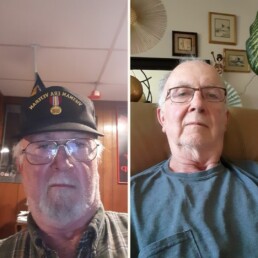
3. What type of weight loss or lifestyle change programs have you tried in the past?
When my girlfriend developed cancer, I quit drinking soda and lost about 20 pounds. Unfortunately, that change didn’t last and I gained the weight back. I realize now that my issue is that I just ate too much and too many calories, all the time. I always cleaned my plate, no matter how big it was, especially when I dined out.
4. Why do you think the First Mile Care program is working for you when others haven’t?
First Mile Care provides you with the tools, knowledge, and guidance to lose weight and get control of your A1C. What I like is that it puts the responsibility into your hands. You decide how to apply the tools and knowledge to your own personal situation. You set your own goals.
The in-person aspect of the First Mile Care group meetings is really, really important to me. It’s not a burden to attend the meetings, as they’re held only 10 to 15 minutes from my home. I like seeing the other group members and sharing information. I want to be able to show success at each meeting. I don’t want to be the only person who gained weight instead of losing, or who isn’t meeting my goals. It’s an incentive to keep pushing ahead.
5. What are some changes you have made as a result of what you’ve learned in your DPP classes?
- I walk over five miles a day (10,000 steps) with my dog and sometimes as much as ten miles. I’m retired, so I have the time. I use a wrist device that tracks steps and distance.
- I dine out now a lot less than I used to. I’ve learned to eat more slowly and mindfully, and to stop eating when I feel full. It used to be that I never left food on my plate but ate every last bite. Now I leave the food or ask for a takeaway bag.
- I still eat pizza, but only once in a while instead of a couple of times a month, and I get thin crust so I’m eating less bread.
- I have always liked vegetables, but I eat a lot more salad than I used to, and I often buy pre-mixed salads at the grocery store.
- I’ve quit buying potato chips and instead eat baby carrots as a crunchy snack.
- I’ve cut way back on sugar. I’m more careful of the sugar in fruit, and I’ve given up drinking sugary soda. I mix up sugar-free drinks or teas instead.
6. What do you enjoy most about the First Mile Care program?
The group dynamic. The camaraderie. Being in the same boat. Having an all-for-one attitude. Maybe it stems from my military background that I like working within a team towards a common goal — to get healthy. While each person is held accountable for their own success, we also want the group to succeed. I want to see each person meet their goals and I personally don’t want to let the group down. I’m going to miss the meetings when I finish the program. When the time comes for the class to end, I hope we’ll exchange contact information and stay in touch.
7. How is the DPP group dynamic?
My group has only a half-dozen people, both men and women. We have a good time, kid around, are supportive, share stories, and encourage each other. We get along really well, despite being from different backgrounds. For example, I’m white, while the others in my group are not. However, most of us work or used to work for Ford Motor Company, so we have that in common. We all live in the same general area, so have the same frame of reference and share information on local places to shop and eat. We spend a lot of time talking about what to eat, how to fix it, and where to get the ingredients.
When the program started, I was the only person who was considerably overweight. The other folks have had less weight to lose, under 20 pounds, but are still at risk for diabetes due to family history. So it’s been interesting to be in the class. In some ways, I’ve had it easier. I’ve been focused on losing pounds and seeing the numbers on my scale change. I get quick positive reinforcement from that, and “attaboys” from the others in the meeting when I report my weight loss. The others have had to work harder to see change since they had less weight to lose. They’ve had to establish other rewards and success measurements than just weight loss.
We encourage each other. I’m motivated by hearing other people’s success stories, and I know that my own story, and that of my girlfriend, has encouraged other folks who were struggling to continue in the program.
8. What role has your coach played in your success?
Coach Kara Torres is always giving encouragement. The program and the handouts let us know that it’s OK if you slip up and that everyone needs a little encouragement at times. She pays attention to what we say we’ve eaten and offers advice. For example, I had no idea how much sugar is in a banana! I also used to drink a glass of orange juice every day at breakfast, thinking it was good for me. Coach Kara made me aware that a single glass could have the juice — and sugar — of as many as five oranges in it! I wouldn’t dream of eating five oranges in one sitting. So, instead of drinking a glass of juice every day, now I eat an orange instead. It’s been an easy way to reduce my sugar intake while still getting my vitamin C and enjoying the taste of the fruit itself.
9. Do you expect to maintain the progress you have made in changing your lifestyle?
Yes, it’s not hard with the food app and the activity tracker that Coach Kara taught us to use. I find it helpful and easy, so I’ve continued with tracking even though we’re not required to do so. I feel so much better now that I can’t imagine letting myself backslide.
- I use the Nutritionix app (www.nutritionix.com/app) to log my food intake. It automatically estimates calories. I try to stay under 2,000 calories a day and the app alerts me if I’m close or go over. I also eat salad now a couple of times a day, and can estimate pretty well in my head how many calories even if I don’t log it into the app.
- I also have an activity watch that keeps track of how many steps I take daily, and how many calories I burn. My dog pesters me for long walks so it’s not hard for me to meet my activity goals.
- I try to stick to my healthy eating during the week, but will allow myself a little treat on the weekend as an incentive. My group talks a lot about ice cream and how a little is OK. It’s all about moderation.
10. What advice do you give to people asking you about joining a lifestyle intervention program like First Mile Care?
I tell people my personal story, of how my girlfriend struggled with her diabetes and how her experience inspired me to take control of my health. It’s not easy to change your habits, but if the alternative is developing type 2, you can find the motivation. For example, one of the people in my First Mile Care group didn’t think he could stick with the program, but he reconsidered after hearing my story. If you have prediabetes, you should do everything possible to reverse it while you still can.
To learn more about how you can benefit from the First Mile Care Diabetes Prevention Program, take the prediabetes risk test and get started today!

